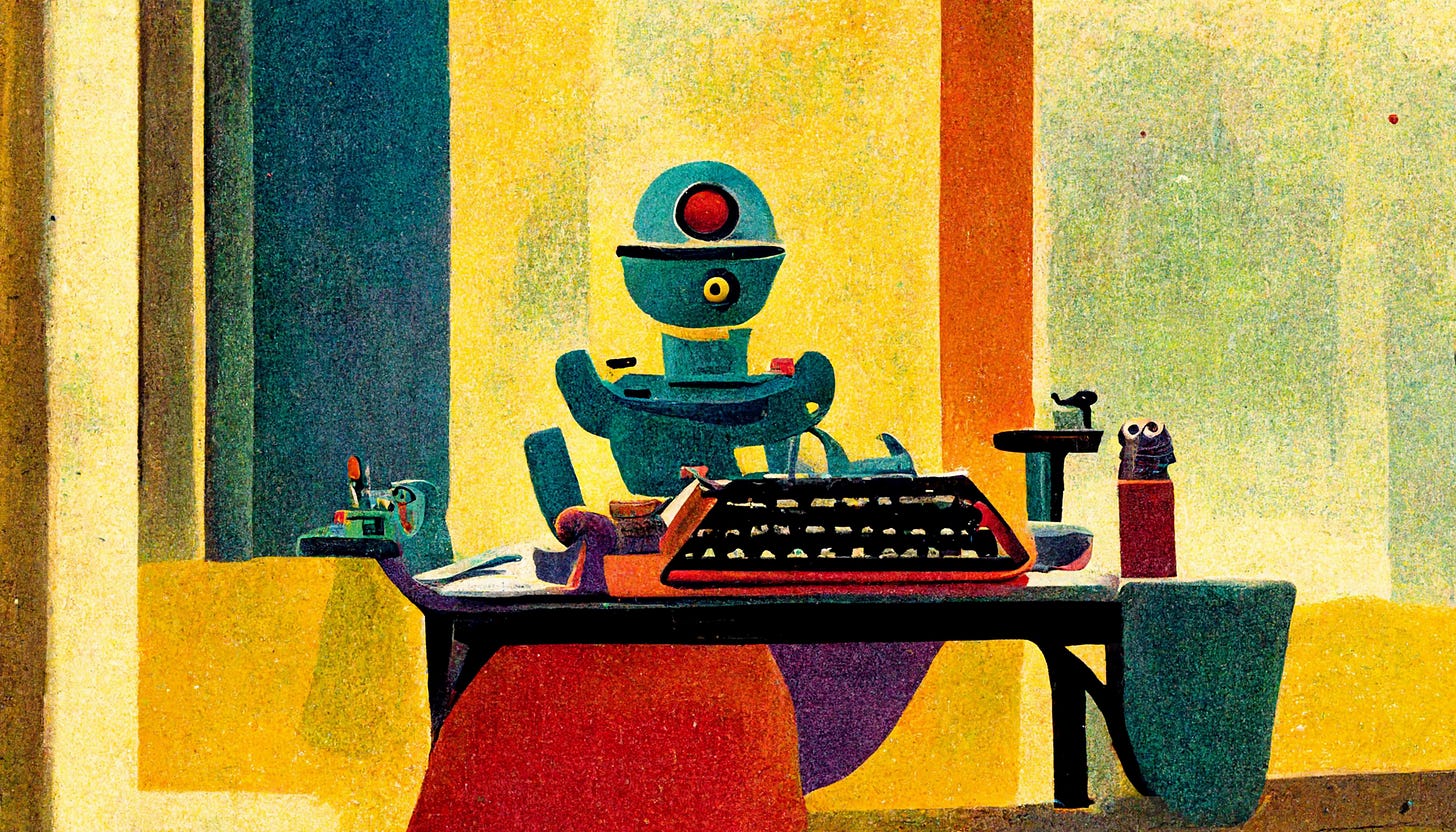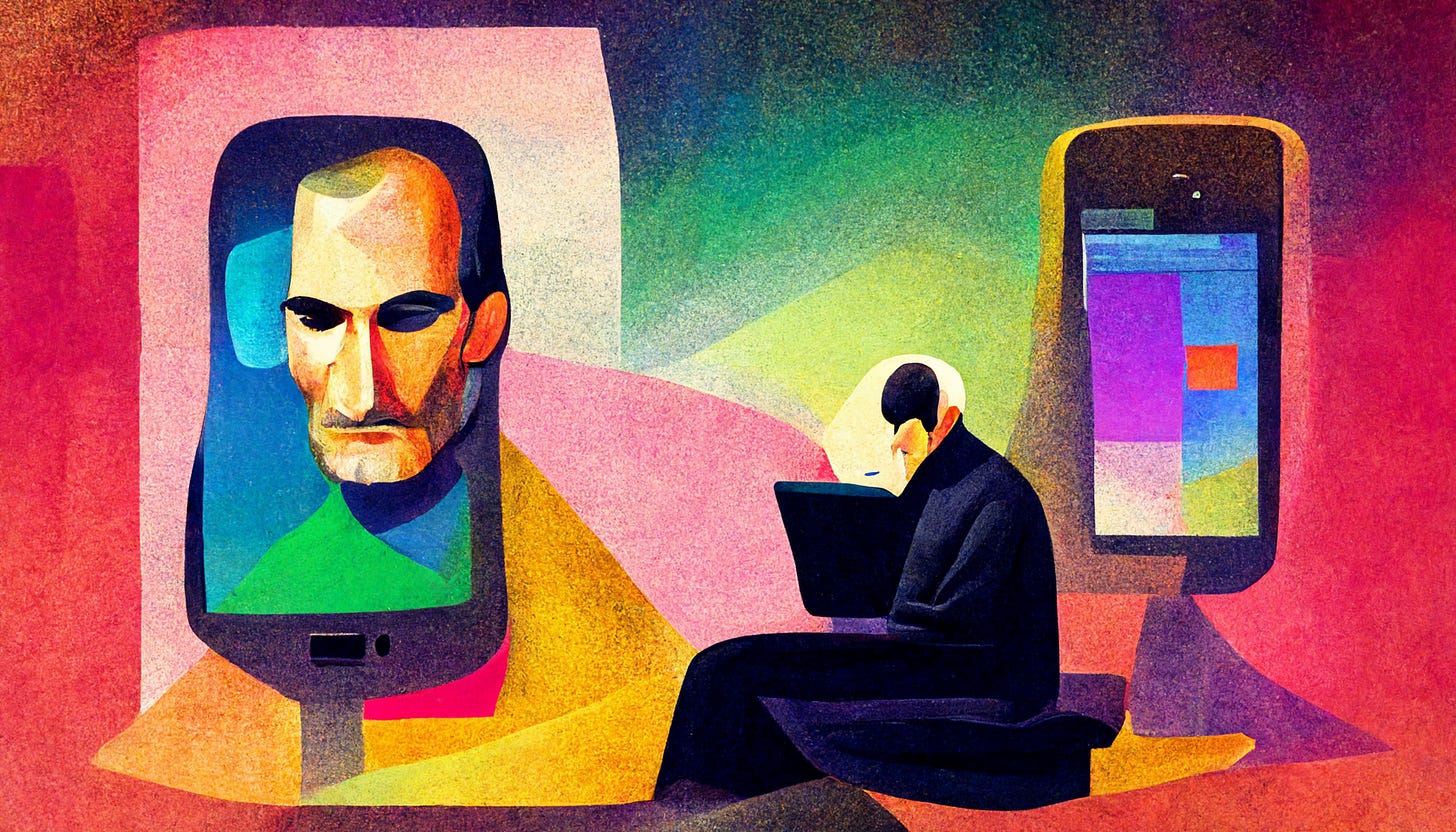Will robots take our jobs?
Some ponderings about AI tech and creative output
In this issue of Story Cauldron, I’m following up with a conversation that happened after my previous article about the AI image tool Midjourney.
Will robots take our jobs?
It’s a question that’s probably on many people’s minds these days. As a creative, it’s difficult to fathom a computer doing what I do—and yet, artificial intelligence is already hard at work in corporate America writing copy and creating images (admittedly with a lot of help from people).
Since I wrote my last article about the possibilities of using the AI platform Midjourney as a tool for my own work, I’ve had several conversations with people about the future of AI in society. It’s a tricky topic with very strong opinions on all sides about whether or not we should fear the coming age of AI.
So I’ve returned here to ponder the question: With the rise of easily accessed artificial intelligence systems entering the creative sphere, are our days as writers and visual artists numbered?
Existing creative AI platforms
It’s difficult to ignore the inroads AI technology has made in the past few years., especially in creative pursuits. I’ve already explored the ins and outs of Midjourney, in which you enter text prompts over Discord and the computer spits out a series of interpretations of that prompt. There are a number of other AI image generators out there but Midjourney appears to be the front-runner in terms of ease of use and widespread accessibility.
When it comes to writing, there are several commercial platforms out there that offer AI-assisted copywriting. There’s Jasper, a platform to write marketing copy. Copy.ai offers to take blog writing, emails, and other writing tasks off your hands. And Wordsmith uses AI to create narratives out of data.
Most people probably have little experience with any of these platforms, as they are new, expensive, and/or too specialized for common use. But AI powers many of the tools we use every day. Software like Grammarly and Pro Writing Aid uses AI to analyze our writing and suggest corrections, and who hasn’t used an automatic filter on their phones or in Photoshop to tweak an image? We constantly encounter AI as automated social media moderation (Facebook jail, anyone?), and automated bots are likely running many of the troll accounts as well. Google uses AI to return “better” search results, and if you’ve contacted customer support lately, there’s a good chance you’ve interacted with AI (in text chats or on the phone) and not even realized it.
Don’t Panic!
AI systems are all around us even as we speak. And although the invasion of the bots seems imminent and inevitable, it doesn’t mean we’re all going to be out of a job in the next five years. In particular, I don’t expect AI will ever replace all human positions, especially in creative fields like art, design, and writing.
Here are a few reasons why I’m not panicking (yet):
Technology has been replacing humans for ages. Cars replaced horse-drawn buggies and carriages. Robots invaded factories. Drones and autonomous-driving cars are on the precipice of replacing delivery drivers, cabs, and ride-sharing (at least as driven by people). And somehow, instead of finding more free time, humans always manage to find new ways to make a living. (Good old Capitalism coming to the rescue?)
AI technology is only as good as the information behind it, which comes from real people. For example, when it comes to Midjourney, all of the images that the AI remixes originated in photos and artwork that exist somewhere on the web. For example, an artist named Greg Rutkowski was aghast to discover just how deeply Midjourney has mined his own creations. Sure AI art is cool, but we need to remember that it’s not creating new content, but cannibalizing existing works, and my guess is someone will put an end to that sooner or later.
Most of what AI creates isn’t really that good, objectively speaking. With both image and writing sites, the output generally isn’t stellar, and to make the AI images or copy commercially viable, it needs tweaking—by a human. This kind of content is also pretty obviously computer-generated—at least for now.
AI output tends to look and sound the same. I suspect it won’t be long before AI writes a complete novel (if it hasn’t happened already) but anything a computer writes is going to be highly derivative, drawing directly on what has already been done. You can feed a computer a novel beat sheet and it might come up with something passable, but can a computer really write the next Outlander novel or tell a story as compelling as Neil Gaiman can? I don’t think so.
Can AI replicate the human experience?
Art isn’t as simple as following a form or structure, stringing words together, or plotting lines on a canvas. It comes from a lifetime of experiences.
When we write, or paint, or engage in other creative pursuits, we’re pulling from years of learning and practice, taking lessons from teachers, books, videos, performances, and so on. Each one of us experiences the world in a unique way, and each of our brains takes all of the books we’ve read and the music and art we’ve consumed and swirls our memories in a chemical blender.
This incredibly complex process allows us to draw on inspirations while also creating something new—in other words, we’re not just meat-based copy/paste machines. That means we’re not just creating by pulling pieces out of a database and sticking them together, but we’re drawing from lived experience.
When I write a story, it may be about a woman encountering magic for the first time, but it’s also about that time I got stuck outside in the rain, or when I went for a walk in another country and got lost. A computer will never appreciate the joy of falling in love or the grief of the loss of a loved one—it can only approximate those emotions. And it can’t understand how the light comes in through your office window in the afternoons, reminding you of the same light that blinded you for just a couple of moments every afternoon in first grade.
Even more than visual arts, storytelling is the essence of being human. I cannot fathom how a computer—regardless of how well designed and programmed it may be, or how many millions of different data points it can draw upon—could ever replicate the human experience.
So is AI OK by me?
Don’t get me wrong. I would never claim that AI is always useful, helpful, or benign. In fact, I’m very concerned about the potential for AI to be used for fraud, deep fakes, and political manipulation, among other things. For example, Gizmodo just wrote about an AI-generated interview between Joe Rogan and Steve Jobs on podcast.ai (link to podcast). But it’s not the real Rogan or Jobs—the interview is a series of clips strung together in a semblance of logical thought. It’s weird and unsettling—and for now, obviously fake. Soon, however, fake interviews will be impossible to identify. (And don’t get me started on the topic of AI tech being used in policing and warfare.)
Furthermore, I fully expect that we’re about to face a tsunami of AI-generated art, music, and writing. It’s the new thing, it’s cool, it’s fast, and it’s cheap. Of course, there will be AI novels soon, and movies and games that draw heavily on AI-generated art. It’s inevitable.
I just don’t think that we storytellers and artists need to worry too much about competing with AI—at least not right now. There will always be someone who wants to read something unusual and different, and always someone who wants designs that don’t look like everything else out there.
What do you think? Are we doomed, or is there hope for humanity? Let me know.








As a psychotherapist and psychoanalyst--a human among millions of other humans who believe that AI and other digital interfaces are no substitute for positive OR negative interpersonal relationships--I am heartened to read this. It is impossible, for example, for AI to replace the capacity to observe human (and animal) behavior that led John Bowlby to develop his theory of attachment, that Mary Ainsworth and Mary Main both expanded upon. Bowlby's work started in the 1950s and 60s, through his contact with European ethologists, and developed over three decades, with Ainsworth and Main, into the 80s. Peter Fonagy, in the late 90s and early 2000s, expanded upon their work to develop the concept of mentalization, which he described as more complex than empathy, i.e. "having one's mind in mind." In other words, the imagining of another person's experience--mentalization--is what gives rise to feelings of empathy. I think AI would be hard-pressed to truly mentalize the experience of a human being. Psychoanalysts, who are supposedly trained--as am I--to think in these terms, still make interpersonal mistakes, which we are also supposed to be mindful of attempting to repair. At the end of the day, we are, in the words of psychoanalyst Harry Stack Sullivan (1892-1949), all "much more simply human than otherwise." And, despite the state of the world and the growth of unenlightened despotism that is visible all around us in its various iterations, often fed by digitally created falsehoods, I am thankful for the humanness, and humanity, that remains.
I'm so glad you wrote this. It is reassuring. Not that I was worried about any robot taking my job; I am "no longer gainfully employed," that is, I have 'retired' to write a novel. (It is going well; and I challenge any fucking AI program out there to replicate what I have done.)
But you are correct, I think, to place your worry on the nefarious stuff that can emerge in the World of Misinformation. It will drive the social media police batty. (A possible positive outcome? People will so tire of trying to determine whether something is true or false, they will leave. And write books. Or go for walks. Or expand their garden.)
I do worry about music; as a father of a composer and musician I know that Spotify has already wrecked her cash flow. But this: My uncle was a world class pianist who gave his last solo concert when he was 99 to a packed hall. I asked him once what changes aging had brought (he was arthritis-free and compulsively careful about his hands) and he said, "What I have lost in dexterity, I have replaced with my heart."
And that's it, really. We have hearts. Robots do not. Ai does not. Long live humans.